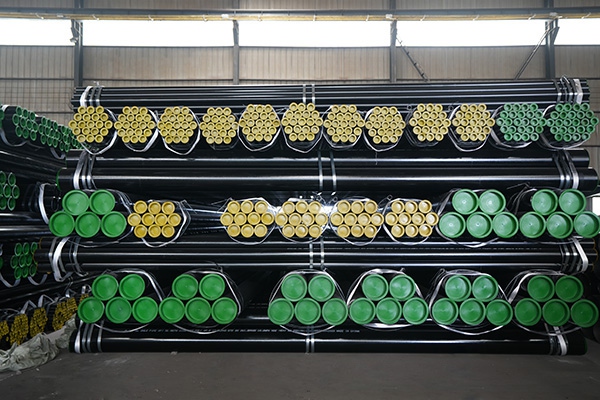
Refinery operations and petrochemical processing rely heavily on robust piping systems that transport crude oil, gas, and other fluids under extreme temperatures and pressures. At the heart of these systems lies the Refinery Pipeline Tube, a critical component designed for safety, efficiency, and durability.
To maintain operational reliability, these tubes must conform to internationally recognized standards and pass rigorous quality inspections. Leading China factory manufacturers provide bulk supply of high-quality pipeline tubes, combining precision engineering with cost-effective production to serve refineries worldwide.

1. Understanding Refinery Pipeline Tubes
A Refinery Pipeline Tube is a specially engineered steel pipe that carries fluids across different refinery units or petrochemical plants. Unlike conventional pipes, these tubes are designed for:
·High temperature and pressure resistance
·Corrosion resistance against sulfur, hydrogen sulfide, and acids
·Accurate dimensions for tight connections
·Compatibility with welding, flanging, and bolting systems
Materials commonly used include seamless carbon steel, alloy steel, and stainless steel, selected based on operational needs. Tubes produced by China factory suppliers maintain tight tolerances and material uniformity, making them ideal for bulk projects.
2. Essential Standards for Pipeline Tube Quality
Refinery pipeline tubes must comply with global codes to guarantee performance and safety.
ASTM / ASME Standards
·ASTM A106 / ASME SA106: Seamless carbon steel tubes for high-temperature applications
·ASTM A312 / A213: Stainless steel tubes resistant to corrosion
·ASTM A335: Alloy steel for high-pressure and high-temperature applications
API Standards
·API 5L: Line pipe specification for oil and gas transmission
·API 5CT: Casing and tubing for drilling operations
ISO / EN Standards
·ISO 3183 / EN 10216 / EN 10217: Requirements for seamless and welded steel tubes in industrial processes
·ISO 9001 & ISO 14001: Quality management and environmental compliance
By adhering to these standards, China suppliers ensure that every bulk shipment of refinery pipeline tubes meets stringent global requirements.
3. Material Selection and Testing
The longevity of refinery tubes depends on the steel grade and testing methods.
Common Materials
·Carbon Steel (A106, A53): Economical and strong for general pipelines
·Stainless Steel (A312, 304/316): Corrosion-resistant for chemical lines
·Alloy Steel (A335 P5, P11): For high-pressure and high-temperature zones
·Duplex Stainless Steel (S32205): Combines high strength and corrosion resistance
Testing Procedures
·Hydrostatic pressure tests to ensure strength
·Ultrasonic and eddy current inspections to detect defects
·Chemical composition verification for material integrity
·Dimensional and surface checks for precision
Top China factory manufacturers provide full inspection reports and certifications with bulk supply orders, ensuring reliable quality and traceability.
4. Applications in Petrochemical Plants
Refinery pipeline tubes are indispensable across multiple process areas:
Crude and Gas Transport
Seamless carbon steel tubes carry raw feedstock to distillation or processing units.
Heat Transfer and Steam Lines
Alloy and stainless steel tubes deliver high-temperature steam for cracking, reforming, and distillation processes.
Chemical and Reaction Pipelines
Corrosion-resistant tubes handle aggressive chemicals such as acids, ammonia, and hydrogen compounds.
Cooling and Condensation Systems
Precision stainless steel tubes efficiently condense vapors in heat exchangers.
Waste Handling
Tubes transport byproducts and waste fluids safely to treatment facilities.
China suppliers also offer customized elbows, fittings, and pre-fabricated pipeline assemblies, simplifying installation and reducing downtime.
5. Advantages of China Factory Bulk Supply
Choosing China factory manufacturers for refinery pipeline tubes provides multiple benefits:
·Consistent quality and compliance with ASTM, API, and ISO standards
·Bulk supply capability for large-scale refinery or petrochemical projects
·Competitive pricing and cost savings
·Custom dimensions and materials to suit unique project requirements
·Advanced inspection and certification for each shipment
This approach minimizes supply chain risks, ensures project timelines, and guarantees uniform quality across all installed tubes.
6. Future Trends in Refinery Tubing
The industry is evolving toward advanced materials and sustainable operations:
·Hydrogen-ready pipelines for green energy initiatives
·High-alloy or super-duplex stainless steel for extreme conditions
·Smart monitoring systems integrated for predictive maintenance
China-based manufacturers are investing in these innovations, ensuring that bulk refinery pipeline tube supply meets the needs of modern petrochemical plants globally.
Conclusion
A Refinery Pipeline Tube is more than just a pipe — it is a vital part of refinery and petrochemical infrastructure, ensuring safe, efficient, and uninterrupted operations.
By sourcing from a China factory manufacturer with verified bulk supply, engineers and contractors can ensure consistent quality, strict standard compliance, and cost-effective procurement. Whether used for crude oil transport, chemical reactions, steam lines, or cooling systems, Refinery Pipeline Tubes from China suppliers deliver the performance, durability, and reliability essential to modern refineries.
References
GB/T 7714:Bhatia A. Process Piping Fundamentals, Codes and Standards[J]. Continuing Education and Development, Inc https://www. cedengineering. com/userfiles/Process% 20Piping% 20Fundamentals,% 20Codes% 20and% 20Standards, 2016, 20.
MLA:Bhatia, A. "Process Piping Fundamentals, Codes and Standards." Continuing Education and Development, Inc https://www. cedengineering. com/userfiles/Process% 20Piping% 20Fundamentals,% 20Codes% 20and% 20Standards 20 (2016).
APA:Bhatia, A. (2016). Process Piping Fundamentals, Codes and Standards. Continuing Education and Development, Inc https://www. cedengineering. com/userfiles/Process% 20Piping% 20Fundamentals,% 20Codes% 20and% 20Standards, 20.





